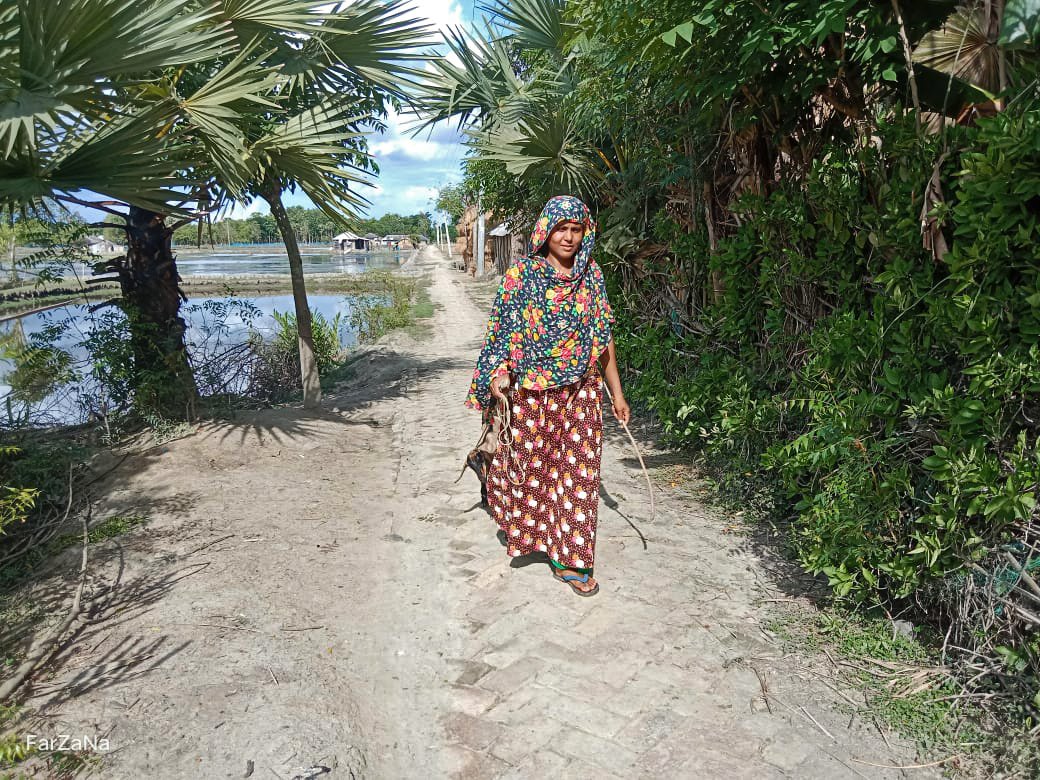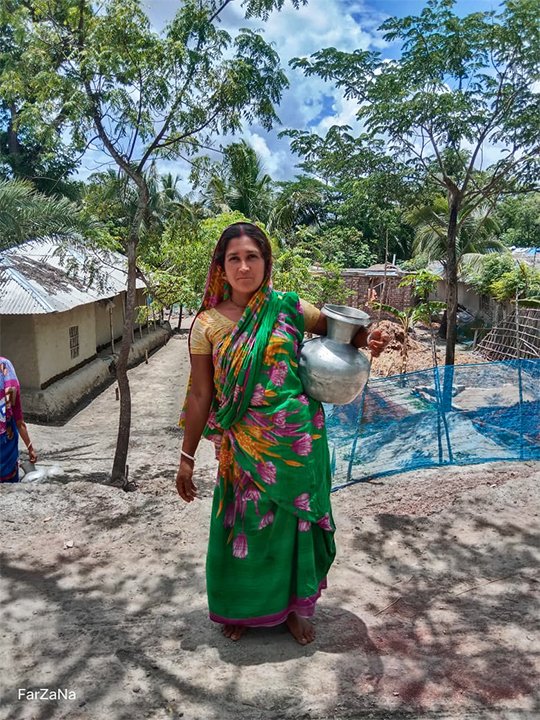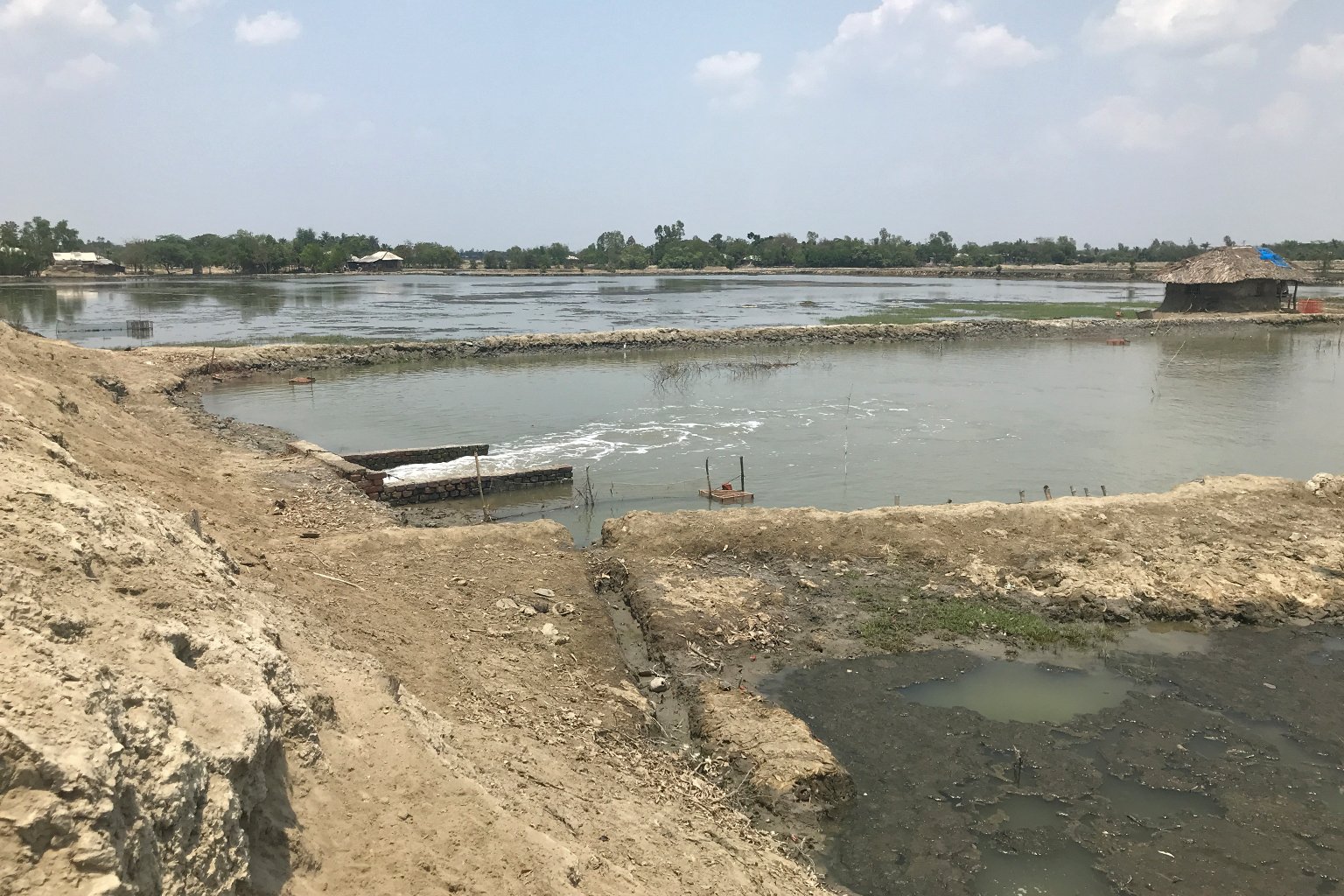- In coastal areas of Bangladesh, where poor families often can’t afford menstrual pads, women and adolescent girls are compelled to use cloth rags that they wash in water that’s becoming increasingly saline.
- This has led to a spate of uterine diseases, prompting many women and girls to misuse birth control pills in an effort to stop their menstrual cycles altogether.
- Health experts say this practice, carried out without medical advice, poses both short- and long-term risks to their reproductive and mental health.
- The root of the problem is the ever-worsening intrusion of saltwater into the water table, driven by a combination of rising sea levels, seepage from shrimp farms, and falling levels of the Ganges River.
The increasing difficulty of accessing clean water is forcing young women in coastal areas of Bangladesh to try to halt their menstrual cycles by misusing contraceptive pills, putting their long-term reproductive and mental health at risk, experts warn.
Saltwater intrusion as a result of rising sea levels and shrimp cultivation has made access to freshwater in these areas increasingly challenging. Compelled by this shortage to use saline water for their feminine hygiene, many women end up getting uterine diseases.
“During my periods, I always used pieces of old rags which I washed with dirty and salty water,” said a 15-year-old girl in the southwestern district of Satkhira. Speaking on condition of anonymity, she said she’s seen her mother suffer from uterine disease for a long time.
“I do not want to experience the same thing,” she said, adding that she began taking birth control pills five months ago from a neighbor to stop getting her periods altogether and thus avoid the problem of having to wash with saline water. Her parents don’t know yet, she said; two of her friends also began taking the pills and stopped their menstrual cycles after following her advice.
Hers is just one of many cases of women, including minors, taking contraceptive pills without any medical advice. Health practitioners say this practice has serious long-term implications.
A major problem for women and girls living in coastal areas is the lack of access to sanitary pads. More than 80% of women and adolescent girls in Bangladesh use old cloths during their period, according to the preliminary report of the Bangladesh National Hygiene Baseline Survey conducted by the government of Bangladesh in association with the International Centre for Diarrhoeal Disease Research, Bangladesh, and WaterAid in 2014.
A more recent study, published in 2019, found that women and adolescents in Bangladesh’s southern coastal region wash their menstrual cloths in saltwater and use them again.
Doing this repeatedly leaves women exposed to various hygiene risks, including skin disease and reproductive health problems.
“Buying pads is not easy for us,” said a 10th-grade student in Satkhira district. “We are washing our menstrual cloths in the pond next to the house or in the surrounding water, which is very salty and dirty, as they cannot be washed in the pond where everyone bathes.”
The student was one of several participants in a workshop in Shyamnagar subdistrict several months ago that sought to raise awareness about the health risks posed by washing menstrual cloths in saltwater. At the workshop, she said, she met other girls who told her they’d addressed the problem by taking contraceptive pills to stop menstruating altogether.
“After returning from the workshop, I stole my mother’s pill and [took] them,” she said.

Risking reproductive health
Government health workers distribute contraceptive pills to women in rural areas of Bangladesh as part of the government’s birth control policy.
Many of these workers acknowledge that the distribution of pills in coastal areas has increased somewhat, but declined to say on the record whether this was due to teenagers taking the pills.
“Pills are the most popular method of birth control in these areas,” said Monira Jamila, a family welfare assistant in Shyamnagar. “Usually, I supply pills to married girls. But sometimes teenage girls collect these pills for their sisters, mothers and aunts.”
A set of pills comprises 21 white and seven red tablets. The user is asked to take 21 white tablets continuously. Then comes a seven-day gap, usually when menstruation starts, during which time she’s supposed to take the red tablets. However, if she doesn’t take the red tablets during those seven days, and then resumes taking the white tablets after the seven days, her menstrual cycle stops.
Dr. Farhana Dewan, secretary-general of the Obstetrical and Gynecological Society of Bangladesh (OGSB), said taking these pills regularly without consulting a doctor can endanger the health of these teenage girls.
“If teenage girls take the pill without a prescription, it is definitely wrong. When we give oral pills to someone, we consider their physical state and only after checking whether the person is eligible for the pill do we suggest they take it,” she said, adding that these drugs have various side effects.
“Stopping periods by taking the pill for one month is probably fine. However, if period is stopped day after day, there can be a negative impact on the part of the brain from where the stimulus comes. At one stage, she will not have regular periods anymore. This can lead to infertility,” Dewan said.

Climate change at the root of the crisis
The root of this problem is the lack of access to freshwater in coastal areas, due to the adverse effects of climate change.
Several studies attribute this problem of saltwater intrusion into the water table as a combination of sea level rise, commercial shrimp cultivation, and the seasonal drop in the level of the Ganges River.
A 2016 study found Bangladesh has experienced sea level rise of 7-8 millimeters (more than a quarter of an inch) per year in the Ganges tidal floodplain. Similar trends have also been observed in the Meghna estuarine floodplain and in the Chittagong coastal plains.
And then there’s commercial shrimp cultivation, which started in the 1980s and saw large swaths of arable land near freshwater ponds converted into saltwater pools for shrimp. Over the decades, vast volumes of this saltwater has seeped into the ponds, turning their water brackish. A 2018 study estimated that salinity affected 26% of the country.
A 2013 study found groundwater salinity many times higher than what’s considered drinkable in most areas in the country’s coastal districts. It recorded salinity levels as high as 12,433 milligrams of chloride per liter of freshwater — far in excess of the 300 mm/l that both the World Health Organization (WHO) and the Bangladesh Department of Public Health and Engineering (DPHE) considered drinkable.

For women and girls in coastal areas facing the choice of either struggling with uterine disease or putting their long-term reproductive health at risk, sanitary pads are an obvious solution. But most of these families can’t afford the 150 taka ($1.60) a month that pads would cost.
Lakshmi Rani Mandal, from a village in Satkhira sums up the reality of the situation for many families here: “I cannot even imagine buying pads for my daughter when it is difficult to get three meals a day.”
Banner image: A woman in Satkhira district washes dishes in a pond. Image by Jesmin Papri for Mongabay.
Citations:
Abedin, M. A., Collins, A. E., Habiba, U., & Shaw, R. (2019). Climate change, water scarcity, and health adaptation in southwestern coastal Bangladesh. International Journal of Disaster Risk Science, 10(1), 28-42. doi:10.1007/s13753-018-0211-8
Rabbani, G., Munira, S., & Saif, S. (2019). Coastal community adaptation to climate change-induced salinity intrusion in Bangladesh. Agricultural Economics: Current Issues. doi:10.5772/intechopen.80418












